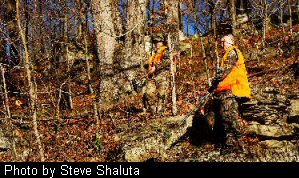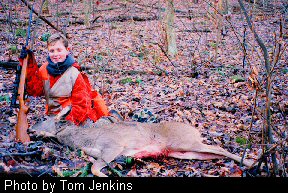

Passing On Hunting Traditions To The Next GenerationBy Gary M. Foster
I can still remember as a child tagging along with my dad in pursuit of bushy-tails and the excitement in the hunting camp on the evening before the opening day of deer season. Unfortunately, in today's society, fewer youngsters and adults experience these memories and the enjoyment associated with the hunting experience and our wonderful outdoors. The 2001 National Survey of Fishing, Hunting, and Wildlife-Associated Recreation documents that since 1991, the number of hunters across the United States has declined by approximately 7 percent or 1.1 million individuals. During this same period our nation's population has grown by approximately 12 percent. A glance at West Virginia 's statistics also reveal a decline in hunter numbers, although this downward trend is not as significant as in other states. Although much of this decline is likely associated with our state's aging population, which ranks 49th oldest in mean age among the states, decreased interest by our youth may also be contributing to the decline. In today's society, unlike years ago, youngsters are involved in numerous other activities which compete for their free time and interests. Expansion of youth athletic programs, home-video games and the Internet craze are a few of the activities which occupy a large portion of our children's time today. State fish and wildlife agencies across the nation have reported significant declines in the number of youth hunters. This negative trend is a real concern for the state's natural resources managers. Fish and wildlife management and research programs, in addition to law enforcement activities, are largely funded through hunting and fishing license sales. Therefore, declines in the number of hunters and anglers could result in reductions in fish and wildlife-based programs and services. Hunting also has a $366 million impact on West Virginia 's economy as a result of hunter expeditions. Furthermore, regulated hunting is a sound management tool that helps control and maintain wildlife populations at desirable levels. To help offset these negative trends, state wildlife agencies have implemented special seasons or hunts to provide additional youth hunting opportunities. The primary objectives of these special seasons are to encourage youth to participate in hunting and to develop an interest and appreciation for the outdoors and our state's natural resources. In addition, special youth seasons provide an excellent opportunity for adult mentors, while not carrying a firearm, to provide one-on-one instruction to the youth on various aspects of hunting such as proper gun safety, hunter ethics and the development of hunting skills. Both resident and non-resident youth hunters currently have three special hunting seasons available in West Virginia . All of these seasons are established during times when kids are out of school and when the woods are not crowded with other hunters. A special statewide youth squirrel season was established in 1998. This season was the first season established because most West Virginia hunters traditionally begin their hunting experience pursuing squirrels. Gray and fox squirrels are abundant throughout West Virginia and provide a good challenge to the inexperienced hunter, while also providing an excellent opportunity for success.
A youth antlerless deer season was also implemented in 1998 and has continued to grow in popularity over the years. This season is currently held on private land in parts of the state open to antlerless deer hunting and on designated wildlife management areas. Currently, the three-day split season is held on the last Saturday in October and two days in late December. Youth participants must be at least 10 and no more than 14 years of age and must be accompanied by a licensed adult who is at least 21. The adult must remain near enough to the youth to provide advice and assistance, and is not permitted to carry a firearm. During 2002, youth hunters harvested 4,793 antlerless deer during this special season. Although not as popular as the seasons mentioned above, young waterfowl hunters can also participate in a one-day youth waterfowl season typically held in September. Individuals interested in these special youth seasons should consult the West Virginia Hunting and Trapping Regulations and the Migratory Bird Hunting Regulations which are available at your local hunting and fishing license agent or online at www.wvdnr.gov. Many of our young people today may not have the opportunities to experience the outdoors or the hunting tradition. So I encourage everyone to get involved with youth, whether it is taking a youngster squirrel hunting, bluegill fishing or teaching them about nature on a walk through the woods. Outdoor activities with kids can be some of the most rewarding and enjoyable time spent with young people. One of those memorable moments in my life occurred this past fall when my son was fortunate enough to harvest his first deer during Thanksgiving week. We all need to remember that today's youth are our future leaders, educators, biologists and hunters of tomorrow, so get involved in the lives of our youth. Remember, hunting is a privilege and no one should take our hunting heritage for granted. Gary Foster is the district wildlife biologist stationed in Fairmont. |
 Hunting and other forms of outdoor-associated recreation have historically been a way of life for many West Virginians since the pioneers settled the Mountain State years ago. Presently, more than 300,000 hunters flock to the fields and woodlands each autumn in pursuit of their favorite quarry. Whether individuals hunt to put food on the table, for the excitement of the chase, or for the relaxation and pleasure of being afield on a crisp autumn day, hunting continues to be a popular pastime for many West Virginians .
Hunting and other forms of outdoor-associated recreation have historically been a way of life for many West Virginians since the pioneers settled the Mountain State years ago. Presently, more than 300,000 hunters flock to the fields and woodlands each autumn in pursuit of their favorite quarry. Whether individuals hunt to put food on the table, for the excitement of the chase, or for the relaxation and pleasure of being afield on a crisp autumn day, hunting continues to be a popular pastime for many West Virginians .  The youth squirrel season is traditionally held on the Saturday before the general statewide squirrel season opener in October and is open to youth under 15 years of age. The youth hunter must be accompanied by a non-hunting licensed adult, at least 21 years old, who must remain near enough to the youth to provide advice and assistance.
The youth squirrel season is traditionally held on the Saturday before the general statewide squirrel season opener in October and is open to youth under 15 years of age. The youth hunter must be accompanied by a non-hunting licensed adult, at least 21 years old, who must remain near enough to the youth to provide advice and assistance.